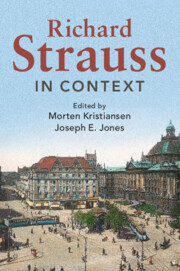Book contents
- Richard Strauss in Context
- Composers in Context
- Richard Strauss in Context
- Copyright page
- Contents
- Figures
- Notes on Contributors
- Preface
- Note on Translation
- Part I Family, Friends, and Collaborators
- Part II Career Stations
- Part III Cultural Engagement and Musical Life
- Part IV Professional and Musical Contexts
- Chapter 19 The Composer
- Chapter 20 The Conductor
- Chapter 21 The Orchestra
- Chapter 22 Program Music
- Chapter 23 Post-Wagnerian Opera
- Chapter 24 The Lied
- Part V In History
- Part VI Artifacts and Legacy
- Further Reading
- Appendix: Letters Bibliography
- Index
Chapter 22 - Program Music
from Part IV - Professional and Musical Contexts
Published online by Cambridge University Press: 08 October 2020
- Richard Strauss in Context
- Composers in Context
- Richard Strauss in Context
- Copyright page
- Contents
- Figures
- Notes on Contributors
- Preface
- Note on Translation
- Part I Family, Friends, and Collaborators
- Part II Career Stations
- Part III Cultural Engagement and Musical Life
- Part IV Professional and Musical Contexts
- Chapter 19 The Composer
- Chapter 20 The Conductor
- Chapter 21 The Orchestra
- Chapter 22 Program Music
- Chapter 23 Post-Wagnerian Opera
- Chapter 24 The Lied
- Part V In History
- Part VI Artifacts and Legacy
- Further Reading
- Appendix: Letters Bibliography
- Index
Summary
This chapter explores the environment of programmatic music-making that centered on the so-called “progressive” composers Liszt, Wagner, and their acolytes, contextualizes the ongoing debates between absolute music and program music that they occasioned, and considers various programmatic compositions outside of that narrow tradition. It gives particular attention to the forty-year period between the appearance of most of Liszt’s symphonic poems and Strauss’s tone poems, in which Hans von Bronsart, Hans von Bülow, Alexander Ritter, Felix Draeseke, and other students of the New German School sought to develop tenets of program music with limited success. Just as integral to the success of program music were the sites and contexts of its performance, as Vienna, Paris, Madrid, and New York welcomed and rejected program music in equal measure. These circumstances shaped Strauss to be a composer open toward, but also healthily suspicious of, program music and its past practitioners.
Keywords
- Type
- Chapter
- Information
- Richard Strauss in Context , pp. 200 - 208Publisher: Cambridge University PressPrint publication year: 2020

